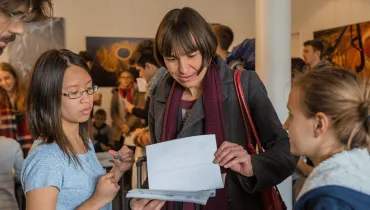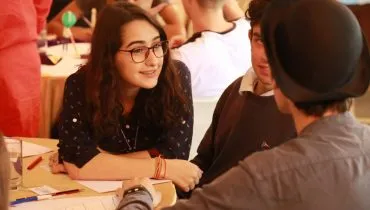
Scroll down for details

Scroll down for details

Alignment and collaboration are essential to developing and implementing a comprehensive strategy for global competence education and training at all levels. This track will clarify the roles and responsibilities of stakeholders in policy development, creating education frameworks and tools, and funding.

Sessions in this track will explore how to better prepare primary and secondary school teachers to incorporate global competence in their curricula and lesson plans. This track will also tackle the impact of the latest OECD PISA assessment of global competence on teacher education.

Participants in this track will define how to create truly intercultural learning environments, programs and curricula that foster global competence and cross-cultural collaboration in higher education, NGOs and professional settings.

NGOs, study abroad, and non-formal education providers have a key role in supporting lifelong-learners’ global competence development. This track will feature some of the most innovative approaches to global competence education through the use of state-of-the-art methodologies, study abroad programs, virtual exchanges, blended learning opportunities and more.

Different stakeholders around the world are already making strides in advancing the global education movement. Sessions in this track will ensure meaningful alignment and collaboration among policymakers, funders, educators, employers diverse local communities, and others who contribute to the “learning to live together” movement.

September 26: 10:30 – 16:30
Explore the role of global competence in achieving the Sustainable Development Goals (SDGs) through presentations, case studies and experiential learning activities. Attendees will gain new ideas and tools to leverage global competence to achieve the SDGs, and participate in small group discussions, role-plays and design thinking to grow their own critical thinking, problem solving and decision making skills.

September 26: 10:30 – 16:30
The new PISA tests are starting to assess global competence of teenagers worldwide for the first time this September, which has created a need for teachers and schools to get more training and support at all levels, from policy-setting to practical implementation. Join this workshop to learn more about the PISA Global Competence Framework: why and how it was developed, what it will measure, its key challenges and opportunities. Get a hands-on experience using several tools for educators to create curiosity for intercultural learning and help their students develop these key skills within classrooms, including the AFS Global Competence Readiness Index for Schools, a new self-assessment tool to help educators determine how prepared their schools are to foster global competence among students.

September 26: 10:30 – 16:30
This workshop will help you learn about the Budapest School and how we structure learning in our unique environment: learning from experiments, focusing on life skills over testing and national standards. We will introduce design thinking techniques and invite you to help us design a modern, personalized, experience-based, diverse and globally ready school environment for 12- to 18-year-old learners, building on our current experiences of working with children up to age of 12.

September 26: 10:30 – 16:30
The main conference sponsor, BP is opening its office doors for a field trip and training. With 2000+ employers from all around the world, the BP office in Budapest is a truly diverse work environment. Participants will get a chance to visit the office and have a taste of BPs Diversity in The Workplace Workshop. The participants will learn about the training portfolio of BP which helps employees to grow their global competencies (agility, flexibility, networking and communication skills) and get introduced to the vibrant social life of the Hungarian office. The workshop will end with getting to know some interesting facts about Hungary.

Facilitated by the Sentio Global Education Network & Purdue University
September 26: 13:30 – 16:30
Are you interested in growing your own global competence to in turn support your students, co-workers or clients? Become a Qualified Facilitator of the Global Competence Certificate (GCC), a unique program that combines in-person and online learning to help people preparing for an experience abroad (study, volunteer or work abroad) to develop interculturally. This workshop will help you understand the development, interpretation, and methods for using the GCC to create an implementation plan. The Qualified Facilitators workshop is open to AFS and Sentio staff/volunteers and external licensed colleagues who are trainers, consultants, coaches, faculty and staff who want to use the GCC. After completing the workshop and submitting a reflection assignment, attendees will be awarded a certificate of completion and a badge to add to their LinkedIn profile. Prerequisite: Complete the GCC curriculum online, in advance of the session.

September 26: 13:30 – 16:30
What do global competence development, preventing early school drop-outs and teacher education have in common? The Knowledge Management Unit of the Tempus Public Foundation will present an overview of the results of their three international projects in this interactive workshop. Participants of the workshop will learn how emphasizing respect among students and teachers in schools, incorporating cultural diversity in the curricula and applying various forms of learning cooperation improve the learning outcomes and enhance the integration of disadvantaged groups. We will lead a discussion on how these factors impact the quality of education and the role of teachers’ professional development.

If you are already registered for pre-conference workshops but did not indicate which one you will join, please fill out this form:


The opening session will set the framework for the conference: Why global competence is the essential 21st century skill required to develop and execute solutions that successfully address the world’s most pressing challenges and leverage our greatest opportunities. Whether participating in a global economy or reducing conflict in diverse settings, research shows that innovation is fueled by new ideas and different perspectives. Global competence harnesses the power of working across differences to spark much-needed creative solutions.



Preparing young people for employment, being active global citizens, and thriving in a diverse world calls for reshaping the agenda for education. Panelists will define the roles that key stakeholders must play—governments, education authorities, social entrepreneurs and the private sector—to integrate global competence into teacher training and curricula development at all education levels.


This panel of interculturalists will share and discuss theoretical foundations for developing global competence, and present two concrete applications from the field. Dr. Mick Vande Berg, a leading and award-winning interculturalist, will share three conceptual frameworks based on the latest intercultural research. Both AFS Intercultural Programs and Ashesi University will show how they used the latest research to develop global competence programs that are grounded in this research, and that address unique needs of both institutions.

Global competence development efforts in education are most effective when they consider the realities and expectations of all stakeholders downstream in the global workforce. Learn about the worldwide research-based definition of “global competence” and the Global Competence Model™ adopted by educators at all levels (primary, secondary and tertiary), businesses, governments, and nonprofits. Understand what a “competency” is from an HR expert, how these constructs are used in the workplace, and why global organizations need students and educators to develop global competence.
Ila Gandhi – Managing Director, Cultural Consulting, Berlitz Corporation

Celebrated on the Tuesday following the widely recognized shopping events Black Friday and Cyber Monday, #GivingTuesday kicks off the holiday giving charitable season, fuelled by the power of social media and collaboration. In this panel discussion, hear from country leaders championing #GivingTuesday movements around the world to develop innovative ideas for your educational institution, explore the role of leadership in campaigns engaging youth and collaborate across organizations and sectors.

Several organizations and initiatives support schools and business in Hungary in global competence development and education processes. This panel, composed of four representatives working with different target groups, will share their innovative approaches and best practices gained while training and supporting elementary and high school students, teachers, university students and employees in developing global competence in Hungary. You’ll walk away from this session with concrete ideas to use in your context – whether it’s a classroom, lecture hall or an HR department.


Scaling up successful intercultural learning programs is not easy or happening quickly enough. This session will define how to scale, replicate and multiply the most successful practices across different contexts, education systems and training environments. A keynote address and two panels will explore key competences, strategies and tools that educators and facilitators require to successfully foster global competence.



Join us for thought-provoking interviews with leaders and innovators in various fields as we discuss how we can create an urgent agenda for global competence education. Our guests Andrea Juhos and Soraia Lynch will join Melissa Liles, Chief Global Engagement Officer at AFS Intercultural Programs to discuss how philanthropy, and corporate social responsibility relate to global competence.